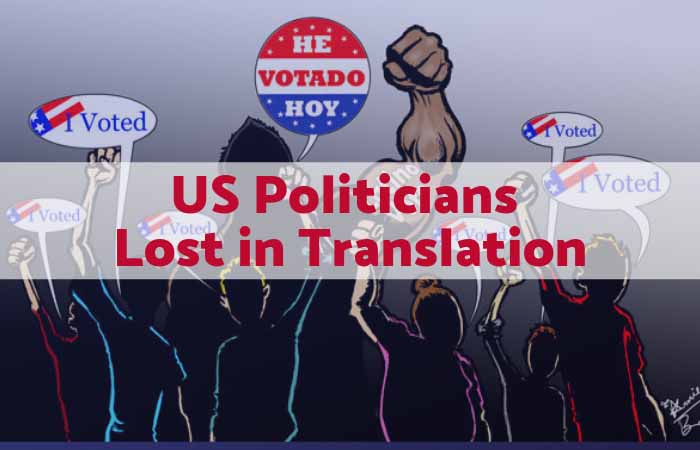The Hispanic population constitutes the largest minority group in the United States, if one counts the population as one ethnic group, and this is only forecast to increase. As such, the Spanish language is not only an increasingly important language in the US for the country’s corporate and cultural spheres but also its politics.
In fact, in the 2020 US elections, the Hispanic electorate (32 million) will overtake the African-American electorate (30 million) for the first time. In recognition of this community’s electoral importance, and in a bid to increase the size of their audience, many politicians try to court Hispanic votes through using the Spanish language in political materials and announcements. The problem? Well, some of them aren’t very good at it for a start.
There are many examples of mistranslations and a lack of cultural understanding, including everything from gender mistakes to direct translations that make little to no sense in Spanish. Amy Klobuchar, the senator of Minnesota, for example, referred to her mother on her website using the masculine rather than the feminine.
Even Julián Castro, the only Latino presidential candidate in the 2020 race so far, showed cultural misunderstanding by erroneously referring to the United States of America as “América” instead of “Estados Unidos”, with América being used in Spanish to refer to the entire continent. All these incidents and many more are subject to criticism and ridicule, likely being a result of using services like Google Translate.
Even when politicians do use Spanish correctly, they can still come across as pandering to the Hispanic population for their vote while ignoring them outside of the electioneering season, a phenomenon that’s come to be known as “hispandering”. Some politicians offer an unequal amount of content in Spanish to what they do in English, while other candidates have tried to pander to Hispanic voters on a cultural level. A famous example of this was when the Hillary Clinton 2016 campaign published an article called 7 ways Hillary Clinton is just like your abuela, which prompted backlash with the hashtag #NotMyAbuela.
This isn’t to say that politicians shouldn’t have a go at other languages to try and expand their appeal. From Jackie Kennedy to George W. Bush, the political class in the US has long taken an interest in the Spanish language, and this interest should indeed be regarded as positive.
However, there is a difference between, on the one hand, expressing a genuine interest in a group, with a desire to show you are listening to them and value their language and culture, and, on the other hand, patronizing them by using their language as a token gesture. It all comes down to attitude.
There is an argument that, as most Hispanic Americans speak English, the aim of this hispandering is just to show that they respect their culture in an environment that can be very hostile to Hispanic Americans and the Spanish language. But even if that is all that is intended, this message would be made all the more powerful through using professional translations and experts and making genuine attempts to understand this group rather than pander to them in a tokenistic manner.








